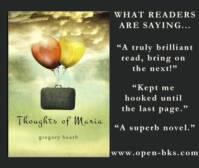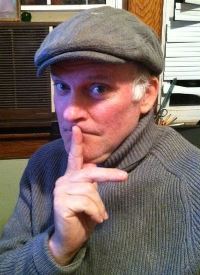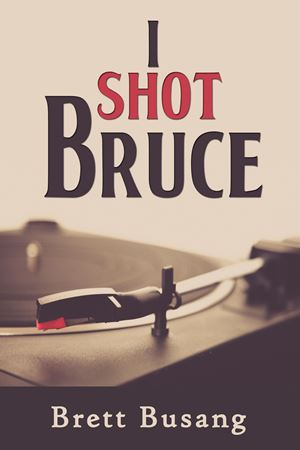Novel Excerpt
From I Shot Bruce
Brett Busang
Vijay Asunder was apprehended by the police yesterday for assassinating the sole survivor of the most popular singing group of the last century. He said that the wound he inflicted wasn’t even comparable to the “festering sores” of rejection, which he has nursed since 1961, when The Keysters let him go in favor of a more polished musician. TV clips from that day show a stunned Asunder leaving the small club where the Keysters were playing. More news as it happens.
Chapter One
And so it happened. It really did. Jake, Marshall, and Townsend summoned me into a small room that was appointed with a single lampshade, smelled of pongy stuff that previous occupants had left behind, and was illuminated to the point of paranoia. I mean, it looked like the FBI was going to come in with assault rifles. All I remember was shielding my eyes and saying “Shit!” It was as if they had orchestrated the event beforehand and had summoned me there as a fait accompli.
“How’re you doin’, mate?” This from Jake, who was always the consortable one. In subsequent years, he was the band’s spokesman, though he put his foot in it now and again. When he said the group had become more popular than the Spanish Premier, he didn’t attract a lot of attention, largely because it was said to a French audience―who ate up that sort of thing. But he escalated his “better than’s” and went all the way up to the Dalai Lama. Some people didn’t think he was overreaching himself, but when the ordinarily even-tempered DL demurred, you knew Jake had committed the gaffe of his career. Sure, he recovered, but he had egg on his face for an entire weekend!
“I’m bleepin’ blind,” I told him. The other guys laughed, as if I were Oscar Wilde and they were Oxford wits down on their luck that morning. It was the morning. The clock said: 11:47. 11:47, my doomsday numbers.
“Adjust the light over there,” said Jake, with a rolling assent from all the rest. Hapless Marshall did the deed. He was always doing our dirty-work. No lead guitar for him when he could supply the rhythm for us. Never got to sing anything but harmony, in spite of his warmish tone and cloud-topping soprano. If you want some world-class resentment, read his memoir, The One Who Carried Water. If a title had ever summarized a group’s tyranny over one man, that one did. When it came out, I wrote him a congratulatory letter. Fucker never did reply. I thought we were simpatico. Guess not.
I muttered a thank you for the adjustment.
“Anything to make you comfortable.” This also from Marshall, who was smiling as big as life―something he stopped doing after the band broke up in sixty-nine. But that was the way he was then. He smiled all the time. A lot of people thought him insensitive―even stupid. But he was possessed of an irrepressible love of life. A good chap, straight lad, dyed-in-the-wool humanitarian. If I regret any one thing greater than the rest, it’s not being able to take the ride with him. He was great fun to be with. Never down. Some people said he was gay, from all the smiling. We never talked about that, though he did enjoy massaging my shoulders. Said if women liked it, why not the blokes as well?
“Uh, we’ve summoned you here to tell you something,” said Jake.
“What? What Armageddon is upon us?” I asked.
“Nothin’ like that,” said Townsend, who was truly concerned about what he called my “pessimistic nature.” Some of us are made that way. I’ve always taken a dark view of things. I think it came from the time that my father not only left my mother, but took a little puppy named Sage with him. I still think about that little dog. He would lick me in the face before I awoke in the morning. One time I smacked him clear across the room. But in a minute, his tail was wagging and he was good to go again.
My father came back, but he also died. A wasted bit of business, really.
“We’ve been talkin’ amongst ourselves, y’know, and have come to a sort of. . .”
“Stalemate.” This from Jake, the only one of us with a so-called higher education. Down the road from Oxford he came, quoting Christopher Marlowe and all the other gits.
“That’s right. A stalemate.”
“But we’ve come up with a solution,” said Marshall again, who was taller than the rest of us. His look alone would have gotten him lead singer in any other band.
“A solution to what?” I asked. I still found the light oppressive, but they’d done all they were going to do.
“This is how it is,” said Jake, leaning over to me confidentially. “We’ve been asked to record a few songs by this curio-sweeper who enjoys his pastries a bit too much, but he seems legit enough.”
Everybody chimed in on that one. “Oh, yeah, he’s legit to the very core.” “No one more legit than Poofy.” “As straight as a fence and hard as a rock.” Quoth Marshall, who seemed to think that was funny.
“That’s great!” I said, little suspecting the trap they’d set for me. I had the pessimist’s reverse optimism whereby I was always hoping for something good to happen, but could never quite believe that it would.
“Yeah, it is. It really is,” said Townsend. “Yes, it’s the thing we’ve always wanted.”
“However,” said Jake, looking like someone with a big quote in him. “However, in order for that desired conjunction to occur, that perfect synthesis of talent and opportunity, that ineffable lining up of the stars...”
“Yes,” said Townsend, “in order for us to get this contract, well, we’ve got to let somebody go.”
“Oh,” I said, already commiserating with that person. (How could I have been so stupid?)
“Yes,” said Marshall, who felt that, of the other two, he could deliver bad news with some grace.
“Well, that’s too bad. A big break for all, but not one, eh?”
“Yes,” said Marshall, who smiled me a big one.
“Well,” I said, wiping my brow with a soiled napkin with the club’s name on it. “Who is it?”
“I’m afraid,” said Jake.
“Yes, it is with profound regret,” continued Townsend.
“It’s never easy to do these things,” hemmed Jake.
“Such a conundrum, you know,” hawed Townsend. (Jake looked at him as if he shouldn’t be using such a word―that it was his word alone. He was like that. I mean, very possessive of language.)
“One must approach the situation with delicacy,” averred Jake.
“And tact as well. Must be tactful―even to a fault!” said Townsend with a concluding flourish. It was now time to state the premise, which, strangely, fell to Marshall, who had the least authority of anyone. Just goes to show you how circumstances make us who we are.
“We’ve got to let you go,” said Marshall, whose smile finally deserted him. His grimness was not of a piece with his smiling nature. It seemed artificial, trumped-up, all wrong.
“What did you say?” I said.
“Jesus,” muttered Townsend. “I hate this sorta thing.”
“If truth were known,” said Jake, “I do also.”
Strangely enough, Marshall did not chime in. It was as if he’d suddenly found his medium: the tight-lipped bearer of Bad News.
“You’re letting me go?” I asked the three of them.
“We aren’t, you understand,” said Jake.
“No we aren’t indeed!” corroborated Townsend.
Nothing again from Marshall. You’ve gotta watch an ex-smiler.
“He, uh, Peregrine…Poofy…seems to think that our image needs a bit ’o tweaking.”
“That’s exactly what he said,” put in Townsend. “Tweaking was his very word.”
“He believes that chemistry is of inestimable importance in the evolution of any group, be it Aborigines, monkeys in the wild, or rock ’n roll outfits.”
“That’s exactly right, Jake-O!” said Townsend.
Marshall merely nodded, and less comfortingly than he could have.
“So we had a kind of summit, if you will, in which various permutations of personnel were discussed.” Jake seemed to enjoy emitting these rolling syllables, sitting there with his guitar slightly out of tune and his mouth slackening, as if he had said somebody else’s lines and was responsible for them only as a third party.
“Yes, that’s correct,” said Marshall, seeming to snap out of something.
“Incidentally, would you care for a cup of something?” Jake asked me, an executioner before the condemned.
I ran a comb through my hair, which was thinning a bit, but not so you’d notice from the stage, and shook my head. Truth to tell, my stomach was absolutely in knots. If I were by myself, I’d probably care to void it.
A girl came in, one of those birdy creatures with straight blond hair, legs that seemed twice as long as they were, and lips that pursed like no librarian.
“Sorry,” she said. “Didn’t know you were in a confab.”
“Perfectly all right, Mother Teresa,” said Jake.
“Want anything, gents?” she asked, shaking her bottom―though I don’t think she shook it. It shook all by itself. She was wearing something that wouldn’t be popular for some time: bell bottoms. And her stripy blouse covered her like a second skin, which showed her bosom to great advantage. This was the day when a great body was shaped as much by the things underneath as by its born-with stuff. Imagine, if you will, a bosom that stuck out at right angles to the rest of her and you’ll get an idea of the impression she made. Her skin was of a tawny hue that reminded me of all of the colors one missed here in London. It suggested tropical fevers, muted sunsets, and careening desires―though I will admit that my views about her were subjective, as were everybody else’s. There was something about her gait as well. It seemed to be made up of separate motions, which, for a split second, operated independently, as in a photograph of a running horse. The hips swiveled; the ankles pushed up; and the bottom rose to meet them. All eyes followed her, including mine. She was a knockout then and nearly a knockout today, though all the plastic surgery is beginning to show. She’ll be giving an interview and her lips seem to form the words long after they come out. Then as now, you looked at those lips and imagined what they could do. She was about our age, but had a more worldly demeanor to her. Jake married her for a while, then Townsend. Then Jake again. She made a lotta money off of that second time. And wrote a book in which she postulated that not only was Townsend gay, the whole lot of them were. She claimed to have pictures, but never produced them. Yet her word for the group―inseparable―stuck. It was always the “Inseparable Jake and Townsend”, the “Inseparable Keysters”, and so on. I started to find it morbidly ironic considering my outcast state. And I never ceased to think of it that way. It is as ironic now as it was then. Some things just last, y’know?
“Let me get this straight,” I said, rising from my chair. I dropped my comb, then a set of keys, then something else, thereby compromising a dignity that was never my strong suit. It seems like clumsy people never make their way in the world, unless they make a comedy routine of it.
“It’s not the way we’d want it,” said Townsend.
“Not really,” said Marshall, whom I wanted to believe, but didn’t.
“You see…” said Jake, picking up my keys for me and jangling them a bit. He didn’t finish his sentence because he found himself, as his many biographies explain, having a “eureka” moment.
“Hmmm,” he said, “that reminds me of something.” And went over to scrawl a few words on a paper napkin. He would later claim that my drumming-out was the genesis of “Finster Boy”, which was one of the first rock songs to use a full orchestra. I’ll have to say that, even if I were ill-used on that day, the song is really powerful. There was a boys choir in it. And some eerie violin-scrapings. They send a chill down my spine to this day. But I hated the chorus then and I hate it even more now, when subtext is so much more obvious than it was at the time.
Oh, Finster’s coming home
Yes, he will never roam
Again!
Oh, Finster, he’s got no pride
But anybody with a grand illusion
Does all right in the end!
I hate that song because it’s about my downfall, but I like it as a work of art―if you know what I mean.
“The boy genius!” said Townsend, as if Jake was one of those bad little blokes you like to reward with some extra rashers when nobody else has anything.
“You’re sacking me. Right here in this smelly little room. You’re sacking me, aren’t you?”
“Well,” said Townsend.
“Sorry, old boy,” said Jake.
“Yes, I’m afraid we are,” was Marshall’s comment, which he made without flinching.
I can’t remember whether I fainted or not, but I lost consciousness the way a swimmer does when he swallows too much water. And if there’s nobody around, he swallows more than a body can stand. I was lucky, wasn’t I? I had three good friends around to prop me up and stuff money in my pocket.
Yeah, good friends indeed…
It was past twelve. But my doomsday calendar began at 11:47―a time I won’t forget for as long as I live.
© Moronic Ox Literary Journal - Escape Media Publishers / Open Books
Moronic Ox Literary and Cultural Journal - Escape Media Publishers / Open Books Advertise your book, CD, or cause in the 'Ox'
Novel Excerpts, Short Stories, Poetry, Multimedia, Current Affairs, Book Reviews, Photo Essays, Visual Arts Submissions
Brett Busang describes himself as a prolific essayist, a moderately interesting playwright, a lapsed painter, an ambivalent anglophile and a failed ballplayer.
He likes people who listen, places from which soccer is notably absent, books without chase-scenes, peace of mind that doesn't come at the expense of thinking, and food he can eat with his fingers.
Having now turned his attention to writing fiction, Brett says, "I like writing fiction because I never know what's going to happen; and because it is always autobiographical and never autobiographical enough. I like to write in various genres because I am easily bored, relentlessly curious, and also because my tendency to 'dart around' is an asset in no other place."
Brett Busang was born in Memphis, Tennessee and now lives in Washington, DC.
Rhiannon Jenkins Tsang reviews Thoughts of Maria by Gregory Heath.
"This is a wonderful tale of loneliness, and Western society’s obsession with financial success contrasted with the naked poverty of parts of the developing world. It is subtly crafted.
After Gerry a middle aged English surveyor divorced, he decides to remarry. As he brings the young Maria back from the Philippines as a “mail order bride” tragedy looms. His drug addict son develops sexual fantasies about Maria while his ex wife Rachel plots revenge.
Heath’s accessible prose disguises a real gift for creating dynamic characters out of what could so easily have turned into a clichéd plot.
The book is composed of short chapters written in the first person, alternating between the points of view of the four main characters. Thus a compelling narrative is created out of the tensions between the various confessions of the characters, of which the omniscient reader, alone, is aware. I could not put the book down
Heath is a gentle wordsmith, who beautifully conveys complex and powerful emotions with simple language. His descriptions of life on a Manila rubbish dump are particularly vivid.
The intervention of the fifth voice of Gerry’s father in the latter half of the novel upset the balance of the narrative somewhat for me. Perhaps it worked as a kind of deus ex machine providing an optimistic counterpoint to a potentially bleak ending. But I was not convinced by it.
Thoughts of Maria would make an excellent radio play. It is deceptively simple, and equally powerful. The characters never say what they really feel. Perhaps there is something of us all in this story. It raises questions about the way family and friends often react when someone steps outside the box to which we they imagine we have been assigned. This is a thought provoking and rewarding read."
Rhiannon Jenkins Tsang,
25th March 2013




